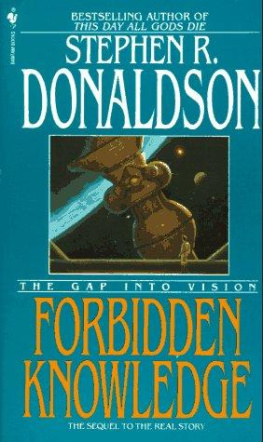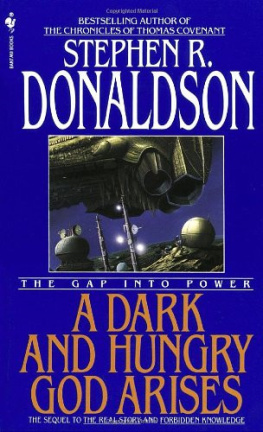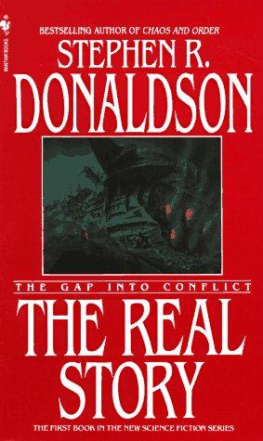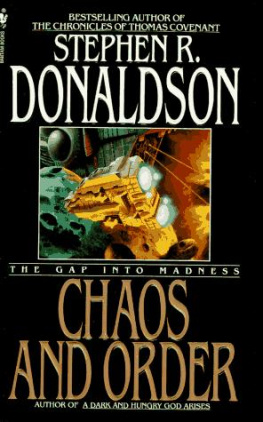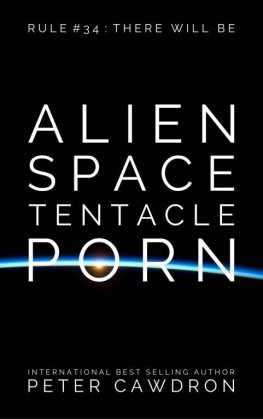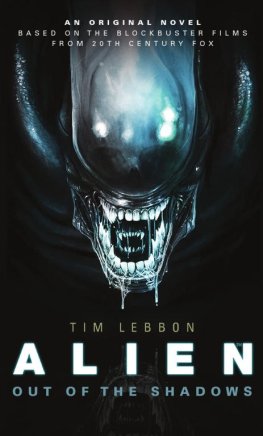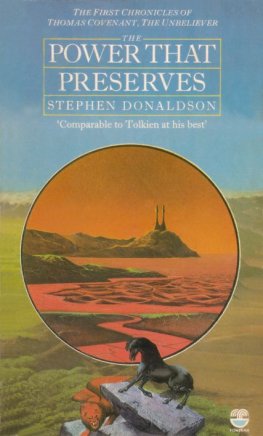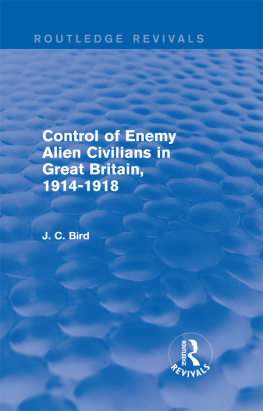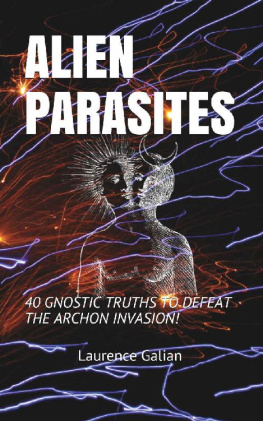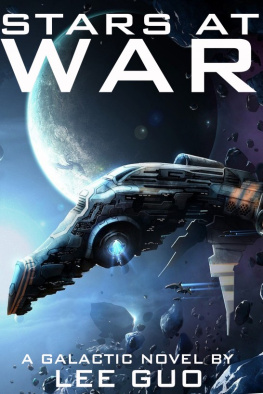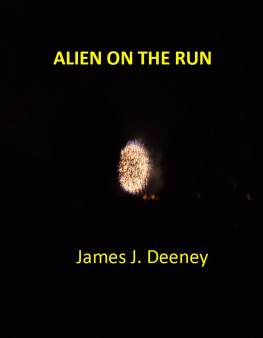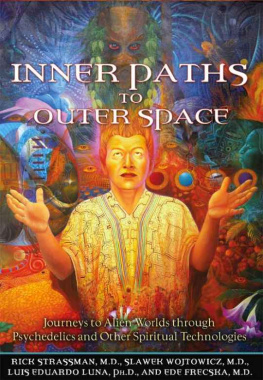Stephen R. Donaldson - Forbidden Knowledge: The Gap Into Vision
Here you can read online Stephen R. Donaldson - Forbidden Knowledge: The Gap Into Vision full text of the book (entire story) in english for free. Download pdf and epub, get meaning, cover and reviews about this ebook. year: 1992, publisher: Spectra, genre: History. Description of the work, (preface) as well as reviews are available. Best literature library LitArk.com created for fans of good reading and offers a wide selection of genres:
Romance novel
Science fiction
Adventure
Detective
Science
History
Home and family
Prose
Art
Politics
Computer
Non-fiction
Religion
Business
Children
Humor
Choose a favorite category and find really read worthwhile books. Enjoy immersion in the world of imagination, feel the emotions of the characters or learn something new for yourself, make an fascinating discovery.
- Book:Forbidden Knowledge: The Gap Into Vision
- Author:
- Publisher:Spectra
- Genre:
- Year:1992
- Rating:3 / 5
- Favourites:Add to favourites
- Your mark:
- 60
- 1
- 2
- 3
- 4
- 5
Forbidden Knowledge: The Gap Into Vision: summary, description and annotation
We offer to read an annotation, description, summary or preface (depends on what the author of the book "Forbidden Knowledge: The Gap Into Vision" wrote himself). If you haven't found the necessary information about the book — write in the comments, we will try to find it.
Stephen R. Donaldson: author's other books
Who wrote Forbidden Knowledge: The Gap Into Vision? Find out the surname, the name of the author of the book and a list of all author's works by series.
Forbidden Knowledge: The Gap Into Vision — read online for free the complete book (whole text) full work
Below is the text of the book, divided by pages. System saving the place of the last page read, allows you to conveniently read the book "Forbidden Knowledge: The Gap Into Vision" online for free, without having to search again every time where you left off. Put a bookmark, and you can go to the page where you finished reading at any time.
Font size:
Interval:
Bookmark:
BOOK TWO OF THE GAP SERIES
Morn Hyland has survived a terrible ordeal at the hands one pirate, only to find herself trapped in the ship of another. Nick Succorso rescued her from Angus Thermopyle, but for
what purpose? He and his crew are all illegals, and she is a cop a cop with gap-sickness. Just having her on board puts all their lives at risk. But Nick knows that Morn possesses something that could be of value to them all and he has every intention of exploiting it.
On the long and hazardous voyage to forbidden space, Morn will hear shocking rumours of high-level corruption, and even more alarming tales of a shadowy alien life force the Amnion and their all-consuming mutagens. All too soon, the bizarre stories will become terrifying reality
Works by Stephen Donaldson
The Chronicles of Thomas Covenant, the Unbeliever
1. Lord Fouls Bane
2. The Illearth War
3. The Power That Preserves
The Second Chronicles of Thomas Covenant
1. The Wounded Land
2. The One Tree
3. White Gold Welder
Short Stories
Daughter of Regals and Other Tales
Strange Dreams (Editor)
Reave the Just
Mordants Need
1. The Mirror of Her Dreams
2. A Man Rides Through
The Gap Series
1. The Gap into Conflict: The Real Story
2. The Gap into Vision: Forbidden Knowledge
3. The Gap into Power: A Dark and Hungry God Arises
4. The Gap into Madness: Chaos and Order
5. The Gap into Ruin: This Day All Gods Die
Voyager
An Imprint of HarperCollins Publishers
77-85 Fulham Palace Road,
Hammersmith, London W6 8JB
www.voyager-books.com
This paperback edition 1997
First published in Great Britain by
HarperCollins Publishers 1991
Copyright Stephen R. Donaldson 1991
The Author asserts the moral right to
be identified as the author of this work
ISBN 0 00 647020 3
To COLIN BAKER:
Who knows how much
good hes done me?
M ilos Taverner sighed, ran his hand back across his mottled scalp as if to verify that what remained of his hair was still present, and lit another nic. Then he glared again at the transcript hardcopy on his desk and tried to imagine an approach that might work without getting himself into so much trouble that the people he was paid to please would turn against him.
He was responsible for the ongoing interrogation of Angus Thermopyle.
It wasnt going well.
That pleased some people and infuriated others.
Angus trial had been a simple enough affair, as such things went. Com-Mine Security had recovered the pirated supplies. The search which located the supplies aboard Angus ship, Bright Beauty, had adequate legal justification. With a number of vague, troubling exceptions, the evidence of the ships datacore supported the charges against him the less damning ones. He mounted no defence, apparently because he knew it was futile. Everything was correct and in order; Angus Thermopyle was guilty as charged.
On the other hand, despite provocative rumours concerning zone implants, rape, murder, and the wrecked UMCP destroyer Starmaster, no evidence had turned up to convict him of anything more serious than the burglary of Station supplies. He was sentenced to life imprisonment in Com-Mine Stations lockup; but the law simply could not be stretched to include his execution.
Case closed.
Station Security had no intention whatsoever of letting matters rest there.
Milos Taverner had mixed feelings about that. He had too many conflicting priorities to juggle.
As Deputy Chief of Com-Mine Station Security, interrogation was his responsibility. True, the present charges against Angus Thermopyle had been adequately proven and true, the evidence didnt justify any other charges. But Security knew Angus of old. His piracies were a moral, if not a provable, certainty; his dealings with illegals of every description, from druggers and psychotics to the bootleg ore industry in all its guises, were unquestionable, if indemonstrable. His crew had a distressing tendency to disappear. Additionally the unexplained chain of circumstances which brought him back to Com-Mine accompanied by a UMC cop who should have died aboard Starmaster was profoundly intriguing not to mention disturbing.
All things considered, Taverner couldnt question the decision to keep after Angus Thermopyle until he broke or died.
Nevertheless the Deputy Chief didnt really want the job. For a number of reasons.
Because he was personally fastidious, he found Angus repulsive. As far as anyone knew, an addiction to nic was Milos only vice. Even people he made no effort to please would have admitted that he was clean, circumspect, and correct in all his dealings. And no sane observer would have ascribed those virtues to Angus.
More than anything, he looked like a toad bloated by malice. His bodily habits were offensive: he only took a shower when the guards forced him into the san cubicle, only put on a clean prisonsuit at stun-point. That and the way he sweated made him smell like a pig. The colour of his skin was like ground-in grime. His mere existence made Milos feel vaguely ill: his presence inspired a sense of active nausea.
In addition his eyes glared yellow with a belligerent wisdom that made Milos feel exposed; dangerously known.
Angus was cunning, crafty; as insidious as disorder. And people like that were risky to work with. They lied in ways which confirmed their interrogators illusions. They learned from the questions they were asked, they gained as much knowledge as they gave as much or more, in Angus case and they used that knowledge to perfect their lies; to work for the ruin of their interrogators even when they had nothing tangible to work with and had themselves been worked over regularly by experts to encourage co-operation. When they should have been at their weakest, they became most malignant.
Angus caused the Deputy Chief to feel that he himself was the one being tested, the one whose secrets might be laid bare; the one put to the question.
And, as if all that werent enough to contend with, Milos had to wrestle daily with the fact that his interrogation was potentially explosive. Angus Thermopyle was an ore pirate. Therefore he had buyers. He had obtained Bright Beauty by illegal if unproven means; had outfitted her illegally. Therefore he had access to bootleg shipyards. Some of his technology smelled alien, and his records were patently too clean, even though they were unimpeachably recorded in his ships datacore. And all those conclusions, all those strands of inference, ran in only one direction.
Forbidden space.
Angus Thermopyle had dealings direct or indirect with secrets destructive enough to shift the balances of power everywhere in the United Mining Companies vast commercial empire. Those secrets could threaten the security of every Station; perhaps they could threaten the security of Earth.
Milos Taverner wasnt sure he wanted those secrets to come out. In fact, as time passed he became more and more convinced that he needed them to remain hidden. Angus silence infuriated some of the people Milos was paid to please: his secrets, if they were revealed, would infuriate others. But the people who hated Angus silence were less immediately dangerous.
On the other hand, every moment he spent with Angus Thermopyle was recorded. Transcripts were regularly reviewed on-Station. Copies were routinely forwarded to the UMCP. The Deputy Chief of Com-Mine Station Security couldnt tackle this assignment with anything less than complete diligence and expect to get away with it.
No wonder he couldnt give up nic. He found the habit disgusting in other people and yet he couldnt quit himself. Sometimes he thought nic was the only thing that enabled his nerves to bear the stress.
Font size:
Interval:
Bookmark:
Similar books «Forbidden Knowledge: The Gap Into Vision»
Look at similar books to Forbidden Knowledge: The Gap Into Vision. We have selected literature similar in name and meaning in the hope of providing readers with more options to find new, interesting, not yet read works.
Discussion, reviews of the book Forbidden Knowledge: The Gap Into Vision and just readers' own opinions. Leave your comments, write what you think about the work, its meaning or the main characters. Specify what exactly you liked and what you didn't like, and why you think so.

